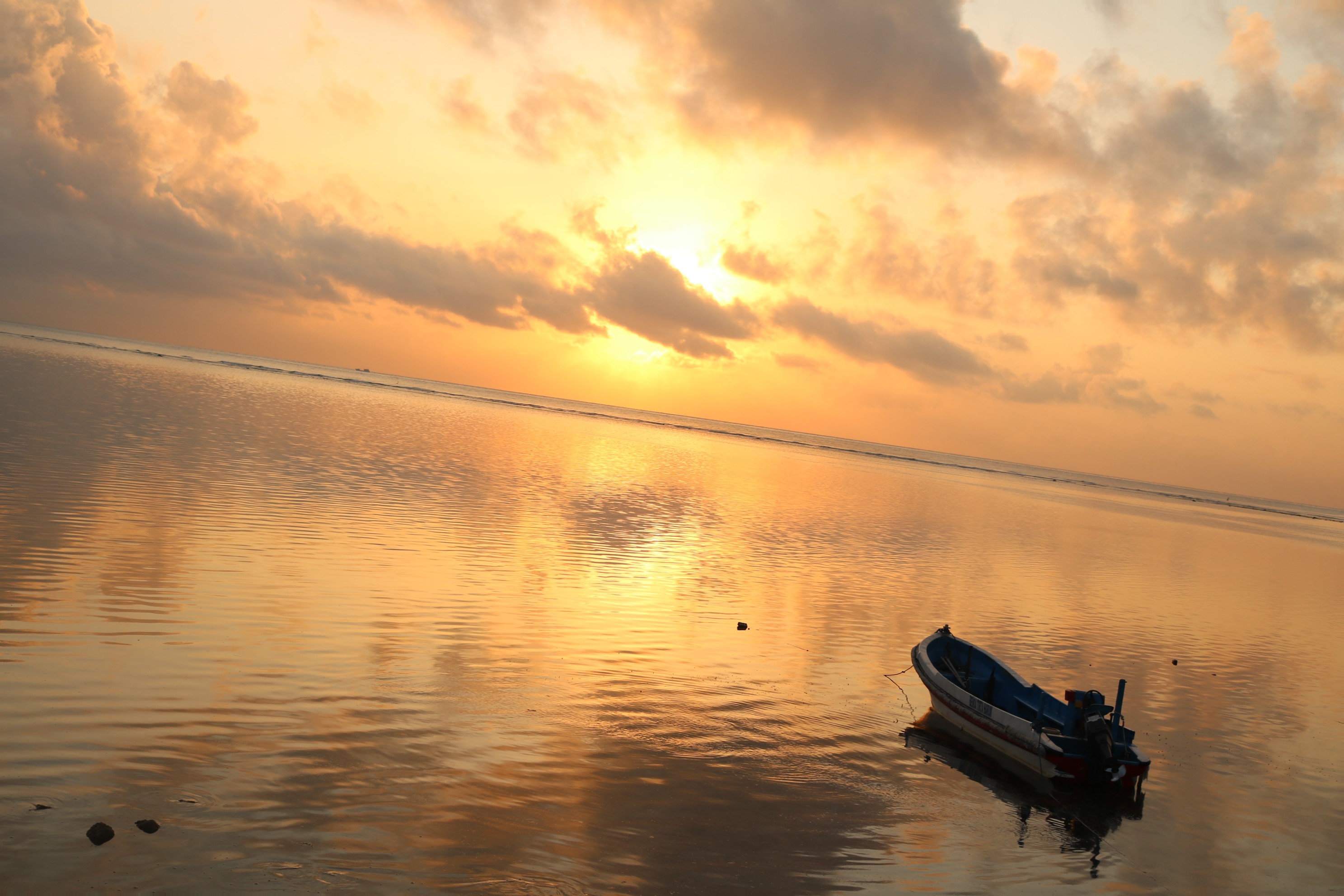
Bali sunrise. Photograph by Priyanthi Fernando
IWRAW Asia Pacific executive director Priyanthi Fernando looks back on her participation at the IMF-World Bank Annual Meeting and considers the pros and cons of engaging with neoliberal institutions. (Read her initial post from Bali: Saying It Loud and Clear.)
In the hotel in Benoa, Bali, where I stayed with other Civil Society Forum participants, I met a senior gentleman from the Sri Lankan treasury, with whom I had a short conversation about the Annual Meetings. “This is just the show,” he said. “The real business happens elsewhere.”
If the plenary session and President Joko Widodo’s ‘Game of Thrones’ speech with all its background special effects was anything to go by, the show itself was quite spectacular! Our hosts, the Indonesian government, pulled out all the stops – to the extent of providing so much security that the beautiful resort area of Nusa Dua resembled a war zone. The colourful Indonesian batik shirts that all male participants, irrespective of their country of origin, were inspired (or instructed?) to wear were almost outnumbered by all the military uniforms escorting us from the airport, on the shuttle buses between the hotels and the venues, and generally monitoring our every move. This, together with news of the ban imposed by the national police on civil society gatherings outside the Annual Meetings, was a constant reminder of the way in which the economic, military and political power of neoliberal institutions coalesce to push a common agenda and silence dissenting voices.
In this context, it felt surreal to be invited as an IMF-sponsored Civil Society Fellow to the IMF-WBG Annual Meetings 2018. Is civil society engagement in such spaces useful? Some reflections follow.
First, my fellow Fellows, sponsored by both the IMF (which does this for all meetings) and the World Bank (whose sponsorship is only for the Annual Meetings) were amazing. They represented 30 different countries; 25 of them were women and 22 were men. There was a strong contingent of young people, including Aya Chebbi from Tunisia, several disrupters (including strong voices from Argentina, Colombia, Jordan, Myanmar, Mongolia and India), and many who have had a long partnership with the international finance institutions (IFIs). There were economists, entrepreneurs, academics, human rights and women’s rights activists, and journalists. The post-session conversations were interesting and varied, and there was the opportunity to hear their views on different panels, but the programme of orientation, during which we were largely talked at by IMF personnel, really could have done more to build on the lived realities of this vibrant group.
Next, the meeting. Bali and batik shirts notwithstanding, the IMF-World Bank meeting is dominated by the Global North. The governance of both institutions ensures that decision making is firmly in the hands of the rich countries – both in terms of the composition of their Boards of Directors, and in the voting process which is based on country contributions. That Saudi Arabia has a seat on the IMF Board of Directors also says something. However, Bank directors seem to be more open to engagement with civil society than their IMF counterparts. Their meeting with civil society may have been orchestrated, but it was more interactive and inclusive. It is interesting also that many of the Civil Society Forum sessions were also largely initiated by CSOs from the northern countries, albeit with participation from their southern partners. It seemed like they had the knowledge of the process and the capacity to specifically engage with the IFIs. Many of the ‘fellows’ were first-timers in this space, and while several of us participated in the different forums, none of us had organised any.
Macro-criticality and the ‘new multilateralism’ dominated the discursive environment of the week. Macro-criticality is central to the way in which the IMF prioritises issues to deal with. My understanding is that in IMF-speak, ‘macro-critical’ means having an impact on the macro economy. There doesn’t however seem to be a given threshold of macro-criticality. How do the people in the IMF know when an issue is macro-critical or not?
The Intergovernmental Panel on Climate Change report released on the first day of the IMF-WBG Annual Meeting raised no doubt that climate change is critical for the survival of the human race on this planet. I am assuming that that makes it ‘macro-critical’. The World Bank has already committed to non-financing oil and gas exploration from 2019. On the other hand, civil society has known and flagged the criticality of worsening inequality and gender discrimination for decades. What triggered the IMF thinking to consider both macro-critical?
I believe that the IMF may have identified gender as macro-critical because it sees harnessing the labour of half the world’s population in capitalist production as essential to boost economic growth (#Women4Growth). It now treads the problematic path of using female labour participation as the indicator of women’s empowerment. As I pointed out in the panel discussion, if women’s empowerment is the goal, should women not be at the centre of the conversation, and should we not be looking at how we could harness growth so it benefits women? #Growth4women and not #Women4growth would be my hashtag!
The panel was impressive, featuring economist heavyweights who showed us how women at decision-making level can, and do, make a difference. It is the leadership of IMF Managing Director Christine Lagarde that has brought gender to the forefront of IMF thinking at this point in time. Indonesian Minister of Finance Sri Mulyani Indrawati talked about making workplaces under her ministry more friendly towards women. Vera Songwe, Executive Secretary of UNECA, highlighted the value of STEM education for women and the importance of recognising women’s contribution to science and technology; and Senior Deputy Governor of the Central Bank of Canada Carolyn Wilkins admitted to pushing the boundaries despite not having a woman role model. It seemed hard, though, to match the panel’s perspectives with the realities of the many women we work with: our partners in Indonesia campaigning against the privatisation of water; the many Indonesian women who travel overseas as domestic workers, facing harsh working conditions; and women and girls who cannot go to school (let alone aspire to STEM education) due to lack of facilities or because they have to look after their siblings and do household chores.
So I reminded the panel and the audience that mostly, women are not sitting around drinking beer or playing cards. That they are already in the labour force, in the unpaid care economy, in the informal sector, and in precarious jobs at the bottom of agricultural and manufacturing global value chains. That it is important for economists and statisticians to value and to count women’s unpaid care work. That many girls around the world do not have the opportunity to go to school. I also asked the panel to reflect on the fact that many of their achievements are possible precisely because other women, less fortunate than themselves, are leaving their own children behind to take on the care work that frees these individual women to achieve what they have achieved.
And being able to say all this in that space was empowering for me. Some things have to be said, and it is important to speak truth to power when one can. And to be able to put people – women, men and children – at the centre of the agenda of international financial institutions. This is what we mean when we say it is our moral imperative to centre human rights in the development discourse. That is what a ‘new multilateralism’ should look like – the merging of the discourse of the IMF and the World Bank with the thinking of the United Nations and the Treaty Body system; valuing human rights at the same level as economic growth.
I took selfies with dozens of people who liked what I said. Others continued to hail me in the corridors and gave me their business cards. Perhaps there could be some movement on counting unpaid care work, but whether my participation will make an overall difference to the macro-critical agendas of the IMF, I don’t know. But I do believe that if we have the privilege of access to these spaces, we can’t stop using that privilege on behalf of those who don’t. We must continue to challenge the agenda, from the inside as well as the outside.

